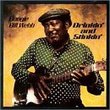| All Artists: Tonto's Expanding Head Band Title: Tonto Rides Again Members Wishing: 4 Total Copies: 0 Label: Viceroy Music Release Date: 6/11/1996 Album Type: Import Genres: Dance & Electronic, New Age, Rock Style: Electronica Number of Discs: 1 SwapaCD Credits: 1 UPCs: 745988603620, 745988803624 |
Search - Tonto's Expanding Head Band :: Tonto Rides Again
CD DetailsSimilar CDs
|
CD ReviewsA brilliant and remarkable work. 08/31/1998 (5 out of 5 stars) "I feel that too often synthesized music is used in order that the musicians do not have to try as hard. People turn on a drum machine, and hide their inadequacies behind the beat. In the case of TONTO (The Original New Timbral Orchestra - the world's first, and still the largest, multitimbral polyphonic analog synthesizer), this is simply not true. The pivotal issue that most attracts me to this disc is the use of music to paint soundscapes - perhaps an overused term, but very applicable in this case. For instance, the initial song, Cybernaut, is a painting of an electronic intelligence roaming the stars, done in a very traditional blues 4/12 beat. Jetsex is exactly what the title states. One central point is that this analogue machine can do things no digital machine has been able to. It produces lower lows and a deep, layered sound that is stunning. Malcolm Cecil and Robert Margouleff have produced an electronic album that remains unsurpassed in my opinion. They were way ahead of their time then, and, in many ways, remain ahead of our time now. This unique disc shows what could be, or at least could have been, for a musical style which has languished in obscurity and ridicule. For these reasons, this disc would be a great addition to your collection, whether you like "electronic music" or not." TONTO, synthesis, and the 1970's David Perry | the road to the next big thing | 09/24/2006 (5 out of 5 stars) "In 1973, I started at a local community college in Huntington Beach, California. They had a course in electronic musical synthesizer, and I signed right up. I had heard as much electronic music as anyone had at that time. Walter Carlos, the BBC radiophonic orchestra, and a smattering of Morton Subotnik. Getting my hands on a synthesizer, on the other hand, was a transformative experience. Our lab had an ARP2600, and some other equipment of the day. By the end of the semester I was the lab instructor in this class---a job I kept for about seven years. Also at that time I took a job working in a record store. It was a great time to work in such a place. There were so many new influences and new movements in music, from avant garde music, to punk rock, to progressive rock to --well--you name it. And touching every single facet of new music (even bluegrass and polka) was the influence of the synthesizer. At the time, you see, synthesizers were exotic and expensive and very difficult to use. Most of the early ones you could plug in, turn on, connect to an amp, turn up the volume, play a key---and get no sound at all. You had to program them, and you had to program them again every time you used them. An analog synthesizer is programmed by making connections between it's different modules with a patch cord. You would also set knobs, switches and sliders to the positions you needed (some of them taking very precise tweaks to get it just right) The program was called a patch. You could record your patch on a piece of paper, either by drawing it on a printed diagram of the faceplate of your synth, or by using an elaborate symbolic code developed specifically to record synth patches. In short--synthesis in the seventies was not very spontaneous. Early synths were cumbersome, methodical, difficult to transport, and generally wanky. But sweet buddah they were cool. (they still are cool, those old synths--look at what they sell for on ebay sometime) There arose, in every town and village of America (and most of the rest of the world) a cult of synthesis. The best known synth composers and performers of the day fit into a number of distinct camps. There were two kinds of rock synthesists. "Keyboard Monsters" and "Synthesists" Keith Emerson, Rick Wakeman and Ian Underwood were all keyboard monsters--they could play anything and everything and featured synthesis for the expanded expression it offered. Most progressive rock is centered around a keyboard monster. Synthesists were primarily into the creation and exploration of a musical soundscape. Brian Eno, Klaus Schultz, Mike Cotton (of the Tubes) Pigpen, and even Thomas Dolby, to an extent, were synthesists. DEVO might be included here, and certainly the RESIDENTS. Classical synthesists included Walter (now Wendy) Carlos, Isao Tomita, the BBC radiophonic orchestra and many others. Avant Gardists and Electronic Musicians might include Bernie Krause and Paul Beaver, Morton Subotnik, Laurie Anderson, and many others. I should write a book--but keep up with me here, I promise to bring it all home. What about Robert Margouleff and Malcom Cecil? Just who are they? What kind of music do they play? Margouleff and Cecil were synthesists. Each of these songs is a sound painting, done painstakingly and with great skill and (I imagine) even greater love. Jazz, pop and rock elements fuse and we experience egyptian sambas, baroque jump tunes, and other bizarre and beautiful hybrids. Margouleff and Cecil, by the way--go way beyond all this. They make movies, write books, and they created the largest studio synthesizer ever assembled (if it was ever surpassed, I am not aware) they created THE ORIGINAL NEW TIMBRAL ORCHESTRA, or TONTO. When the cases were put together in a semicircle, the performers were surrounded by a sphere of synthesizer modules from many different manufacturers. The ordinary ARP and MOOG units were included, as were more exotic pieces including (I believe) the NEW TIMBRAL OSCILLATOR from SERGE. All of these units required different control voltages, different power supplies, different mounting hardware, they even used different patchcords. I imagine this beast took patience to work with. TONTO became a star in it's own light. If you watch the Brian De Palma film "THE PHANTOM OF THE PARADISE" you get to see Winslow Leach imprisoned inside the synthesizer and forced to write a rock opera based on Faust. TONTO used to live in the basement of the Record Plant studio in Santa Monica, California. I do not even know if it still exists. When the second TONTO album came out, I split open the shrink wrap in the record store I worked in, bought the record and put it on the store turntable. Dianne (the store manager) came up to me and asked me if I owned the record that was playing---I replied that I did, and she yelled right into my face for about five minutes on how rotten a thing it was to play a record that we didn't even have in stock--that NONE of us were ever to play personal records in the store. This is thirty years ago and I still remember her getting red in the face, screaming at me, stomping out of the store and driving away. My life has taken me some pretty scary places, but nobody has ever been more angry at me. ever. I was still holding the album in my hand, when another employee came up to me, and elbowed me in the shoulder. "Turn it up all the way" he said. I looked around, everyone in the store was smiling, and they all raised their right fists in the air. "Play it play it play it" they chanted. I dropped the needle on FACE UP/BEAUTIFUL YOU on side one. It was one of those moments that define you. And the song was fantastic--I wonder if they will even be remembered. If you guys read this--make another album with TONTO. persevere" PLEASE can this WONDERFUL MUSIC be re-released? DSR | out beyond the sticks | 08/04/2006 (5 out of 5 stars) "
P.S. Late August 2006... If you type the bands name into a search engine and follow a couple of links, you MAY be still able to purchase a very "limited edition" CD, comprising these tracks (plus a superb "extra" track...) that was prepared for an event in the UK this Summer by Malcolm Cecil himself. To hear this music again, but with such awsome clarity and "body", compared to my LP's, is such a joyful experience I cannot describe it - "Riversong" brought tears to my eyes. Notwithstanding the "analogue" recordings, T.O.N.T.O. really has "never sounded better!" -------------------------------------------------------- The music on this disc is SO important to the history of "popular" Electronic/synthesiser Music that it seems almost a tragedy that it's not available as of mid 2006.... The tracks are beautifully melodic on the whole (except "Jetsex", which is another thing entirely...), disguising their complexity, making the sounds created by Wendy Carlos in the early days seem rather crude by comparison, despite the excellence of the playing. Living in the UK, I was short changed by the original (UK) LP release of "Zero Time", the first album (on Atlantic). The sound was muffled, although the gatefold sleeve was awsome... I caught the second album, "It's About Time" (1975 on Polydor) by the skin of its teeth and, although not as ground breaking as the first (Tangerine Dream and Klaus Schulze were well established in this genre of music by now in Europe), the second side (The Pyramid Suite), had some amazingly beautiful tracks. I was lucky enough to find the re-release of "Zero Time" as a US import in a "sale" and, although the sleeve wasn't as elaborate, the sound quality was much improved, although the LP suffered from crackles here and there. This CD came and went in a flash in 1996 and I didn't find out about its existance until several years later, by which time it was long deleted! I'm not even sure it was available in the UK... If anyone reading this is able, PLEASE can you get these wonderful, uplifting and ESSENTIAL recordings carefully mastered and re-issued, so that we "oldies" and younger students of the genre can enjoy them again? The sincere love, devotion and care that went into their creation was immense - T.O.N.T.O. was reportedly a very difficult beast to keep in tune in the early days and deserves to have a book written about its developement and life in various recording studios... - and they DESERVE to be available once more! " |



